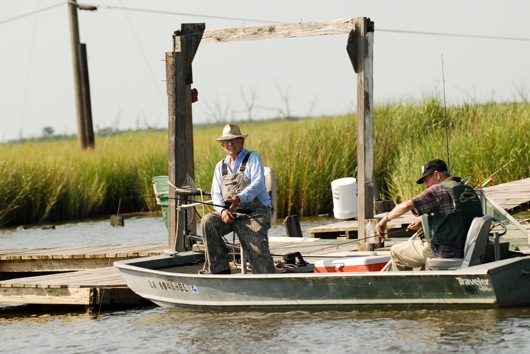Making It Personal: Individual Stories From the Gulf
No one story says it all. Truth is often told through a collection of stories, often comprised of contradictory messages. So it is with the narratives I’ve heard over the past two days. Fisherman, oil rig workers, restaurant owners, military personnel, and a BP disaster relief supervisor have been all too eager to share their experiences and perspective.
Three stories about stress and crisis overload stand out. I met Steve on a dock along the Gulf coast outside of New Orleans, an independent tour boat operator for BP, standing at the ready to take media personnel and environmental scientists out on the water to view oil damage and clean up operations. He refused to give us his real name or to be photographed for fear of losing this lucrative, albeit temporary, job with BP. His way of earning a living is common, a jack of many trades, finding work on the water according to the seasons and the disaster of the moment. During the course of the conversation I asked how it feels working for the company whose gushing oil had shut down his preferred business, fishing. Peering through his mirrored sunglasses, he began naming everything I was wearing that was made with a petroleum-based product. He said rather matter-of-fact, that “oil drilling is here to stay until every last drop is gone. No one is going to change a thing until that day, so no use denying myself work in protest; it’s only going to hurt me in the end.”
After a moment of silence his mood shifted to anger. While convinced that the oil spill has been wrongly portrayed by the media — all beaches are not soiled and such reports have decimated the tourist industry — he believes the Gulf is being slowly killed by a series of environmental tragedies most of us are unaware of, as the Mississippi River dumps its contaminants daily into “his” waterway. He accepts that drilling accidents will happen, but he is furious by BP’s use of dispersants that merely breaks up the oil into tiny molecules, and then sinks it to a depth yet unknown. He said the reason why the beaches are not seeing the level of damage we’d expect is because it has been suspended so far underwater, out of sight in order to remain out of mind. He’s convinced we haven’t even begun to see the full extent of the damage to the marine food chain.
The second story is a window into the world of a gentle Grand Isle native. Tuesday I had the privilege of meeting 79-year old Elaina. She had just received notice that her island community was being evacuated the following day, as a tropical storm is moving right towards us (yes, we are currently in the path of a tropical storm!). She explained how when she first moved into her home 70 years ago, the water was far from land. As the marshes have been destroyed by oil companies dredging, it has crept right up to her door. Throughout most of her life, her home easily handled Category 3 hurricanes and now it can’t even manage a tropical storm. This will be one of numerous evacuations she’s had to endure, and it’s hard on her because she cannot read and is restricted to driving only to places whose names she recognizes. And, it’s expensive. Living on a limited income, she’s still paying off a $1500 debt incurred on her last evacuation.
Steve and Elaina’s sense of well-being and economic stability are both directly impacted by the health of the Gulf. Elaina had little patience for the oil industry while Steve sees our dependence on oil as placing all of us in a position to ‘not bite the hand that feeds our collective appetite’ as he put it. Each on different ends of the spectrum, yet both showing clear signs of distress and believing that better solutions may exist.
The final story is about Steve’s coworker, Mike, the boat pilot who took me on a water tour of the Gulf. The day after our trip, Mike collapsed on the peer after returning from a boat tour. We learned a lot about Mike on our visit, but most evident was his level of economic distress. He feared that the recovery time from his upcoming surgery would cost him his job, possibly sending him over the edge. Co-workers tending to their unconscious friend while waiting for the ambulance to arrive merely said that Mike’s worry may have gotten the better of him that day.
So far the stories I’ve heard continually affirm that how we organize our way of living does matter, not just for the health of the environment, but for the health of all of us as well.
By Anna Berardi
























NO COMMENT
Leave a comment